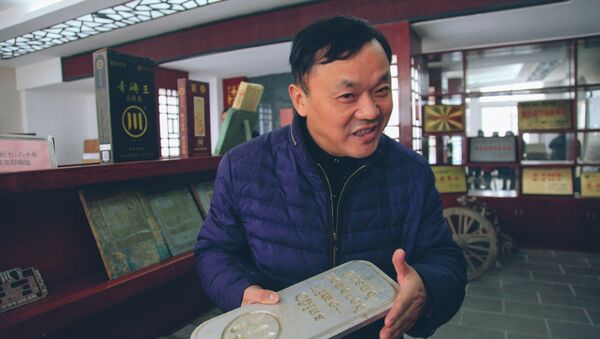Back to the beginning, it was more like the tea chose him, not the other way around.
"Initially, I even did not like drinking tea," said Gan Duoping, the 58-year-old brick tea master who has worked his way up to become the fourth generation inheritor of "Zhaoliqiao brick tea production techniques", adding that he had no special passion for tea making in the early days.
He said the financial situation was such that he barely had meat to eat and there was no spare oil or fat in his body for tea to break down.
It was only after he learned from several tea masters that his attitude to tea gradually changed.
"All my masters have one thing in common: Their love for tea manufacturing," Gan said. "From them, I learned the tea culture and enhanced my theoretical and perceptual knowledge of tea. I no longer merely regard tea as a material thing but has realized that it has its own spirituality. I think it was the power of example that helped me find my passion of tea."
Moreover, trips to Inner Mongolia autonomous region deepened Gan's understandings on the importance of brick dark tea in local shepherds' daily lives.
"Chibi, the hometown of Chinese brick dark tea, was also once the source of Eurasian tea road. In the heyday of the late Qing Dynasty, there were more than 200 tea makers here. Merchants from Russia, Germany and Britain all gathered here to buy and transport tea to Europe via today's Inner Mongolia autonomous region and Xinjiang Uygur autonomous region. The history made me aware that making brick tea is a responsibility for every generation to inherit," Gan said.
Inherit spirits of the craftsmen
Gan, having learned from many tea masters, said every of them had imparted his or her unique wisdom to him.
In the process of tea manufacturing, pile fermentation is the hardest part. No one except Gan among his peers in the factory has done the work for five years.
"The work requires the greatest intensity of labor and it is done on high temperature and dusty condition. No young man would like to do the job."
Xu Aisheng, a pile fermentation technician, told Gan at that time being diligent is the key of the work. Xu set himself an example to Gan as he kept checking tea pile every early morning.
"Being a good person is the first step of making good tea," Gan said. "I have five apprentices now and the most important quality I care about them is moral quality. Next is loyalty to our factory."
Gan himself is a model of loyalty at the factory. Epitomizing the overall tea manufacturing skills, Gan now is a senior engineer and national first level technician. Several companies have offered him high salaries up to 300,000 yuan ($43,522) per year, but he has refused all of them.
"Just like my predecessors who had devoted their life to our factory, I have worked here for more than 40 years. My feelings for it would never change," Gan said.
Keep innovating to grasp the best times
Since 1988, Gan has started writing down the rules in tea production techniques, something his predecessors had never done.
"In the past, masters could only pass their techniques to us through word of mouth. But I believe times are always changing and it is crucial to meet the requirements of consumers at the new time," he said.
Gan has been involved in the national tea standardization work for 28 years and believes it is better for his company to lead the standard rather than chase the standard.
He also has realized that traditional tea production techniques will meet new challenges as consumers' tastes on tea change with their lifestyles.
"It means we have to find a balance between adjusting the tea's flavor according to consumers' changing habits and avoid abandoning good traditional techniques," Gan said.
"I think asking customers to accept new flavors needs time," Gan said. "We are still exploring the best formula."
Facing new challenges, Gan believed now is the best time for tea men like him.
"As Chinese people are getting rich day by day and have greater spending power, the tea market has the opportunity to boom. Brick dark tea, not only having health care function but also suitable for storage, has the potential to become new hot collection," he said.
In addition, under the Belt and Road Initiatives, brick tea made by Zhaoliqiao Tea Factory can further develop markets in central Asian countries, Russia and European Union countries, Gan said.
Zhaoliqiao Tea Factory's brick tea production technique is a national representative of the Intangible Cultural Heritage project. In addition, Zhaoliqiao Tea has been recognized as a China Time-honored Brand.
This article originally appeared on the China Daily website







